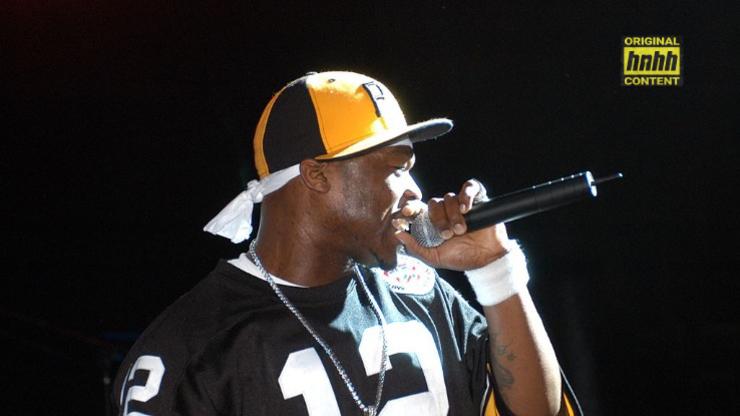The nerve, the audacity, thought Ja Rule, upon witnessing the music video to 50 Cent’s latest Get Rich Or Die Tryin single “21 Questions.” After giving me such a hard time. A fair takeaway from our fictitious imagining of Rule, who previously found himself on the receiving end of some scathing “Back Down” bars. “I’m back in the game shawty, to rule and conquer you sing for hoes and sound like the cookie monster,” rapped 50 Cent, his ire magnified by Dr. Dre’s blood-chilling production. A narrative that was quickly seized by many of Fif’s battle-ready comrades — which is to say the entire Shady Records roster — determined to rewrite Ja’s personal history.
And like that, Ja Rule’s transition from the murderous mind behind Veni Vedi Vici, who once seemed at home spitting bars alongside DMX and Jay-Z, to the “singing rapper” was complete. At least in the eyes of the public, who were becoming increasingly enamored with 50 Cent’s unapologetic reputation as hip-hop’s most talented villain. Despite Ja having recently set the charts ablaze with “Livin’ It Up,” Fifty’s “Back Down” was simply too brutal a blow for Ja’s image to withstand. Yet 50 didn’t merely kill Ja Rule on wax; it’s likely he absorbed part of his soul in the process, imbuing the stone-cold rapper with a never-before-seen sensitivity. Though melodies were often implemented in Fif’s early music, his singsong delivery closer to taunting than crooning, never were they so overtly present — and uncharacteristically saccharine– than in “21 Questions.”

Steve Grayson/WireImage/Getty Images
In a 2007 interview, 50 Cent reflected on Dr. Dre’s first impressions of “21 Question,” imploring the rapper to leave the track on the cutting room floor. “Dre was, like, ‘How you goin’ to be gangsta this and that and then put this sappy love song on?’” reflects Fif, who kindly countered Dre’s counsel with his own desire to express his full character. Evidently, there was a hopeless romantic buried beneath the violent bravado. One that seemed like a far cry from the looming presence that stalked the “Corner Bodega.” That oozed arrogance over Dr. Dre’s thunderous organ-gunfire tandem on “Heat.” That managed to bridge the vastly different worlds of the streets and the suburbs by giving them a vicious and charismatic figure to champion. Yet here he was, declaring his love to be equivalent to that of a glutton’s for cake.

Jeff Kravitz/FilmMagic/Getty Images
In lesser hands “21 Questions” might have been an aberration. It’s vastly different from its fellow Get Rich brethren, both thematically and musically; where both Dre and Eminem tend to operate within the minor key, producer Dirty Swift blessed Fif with the instrumental equivalent to an uplifting daydream. And though he originally protested its inclusion on the album, Dr. Dre’s capable hands perfected the mix, ensuring a sense of sonic cohesion would be retained — why else do you think those drums hit like that? Effectively boom-bap at its core, albeit a slightly more romanticized take, 50 manages to feel at ease over the lush string pads and trebly guitars. Even though he’s essentially baring his deepest insecurities, he does so with the affable charm of a surprisingly relatable leading man. Throw in an immediately catchy chorus from the King Of Hooks himself, the legendary Nate Dogg, and it’s no surprise that Fif caught himself basking in the afterglow of another hit.
Once the initial shock of hearing 50 Cent’s first love song wore off, the many merits of “21 Questions” quickly became evident. For one, it provided the versatility that 50 Cent initially desired to reveal, his vulnerable performance coming off as surprisingly sincere. True, he likely understood the commercial benefits of widening his demographical reach, crafty businessman that he is, but his attempts at diversifying his sound appeared to stem from a genuine place. Given that many of his subsequent singles seemed designed with the female market in mind, it’s entirely likely that Fif developed a framework with “21 Questions,” albeit a more sexually-charged variant. On Get Rich, however, 50 Cent seemed content with building a genuine connection beyond the physical, channeling the spirit of rappers like Fabolous, LL Cool J, and yes — Ja Rule.





